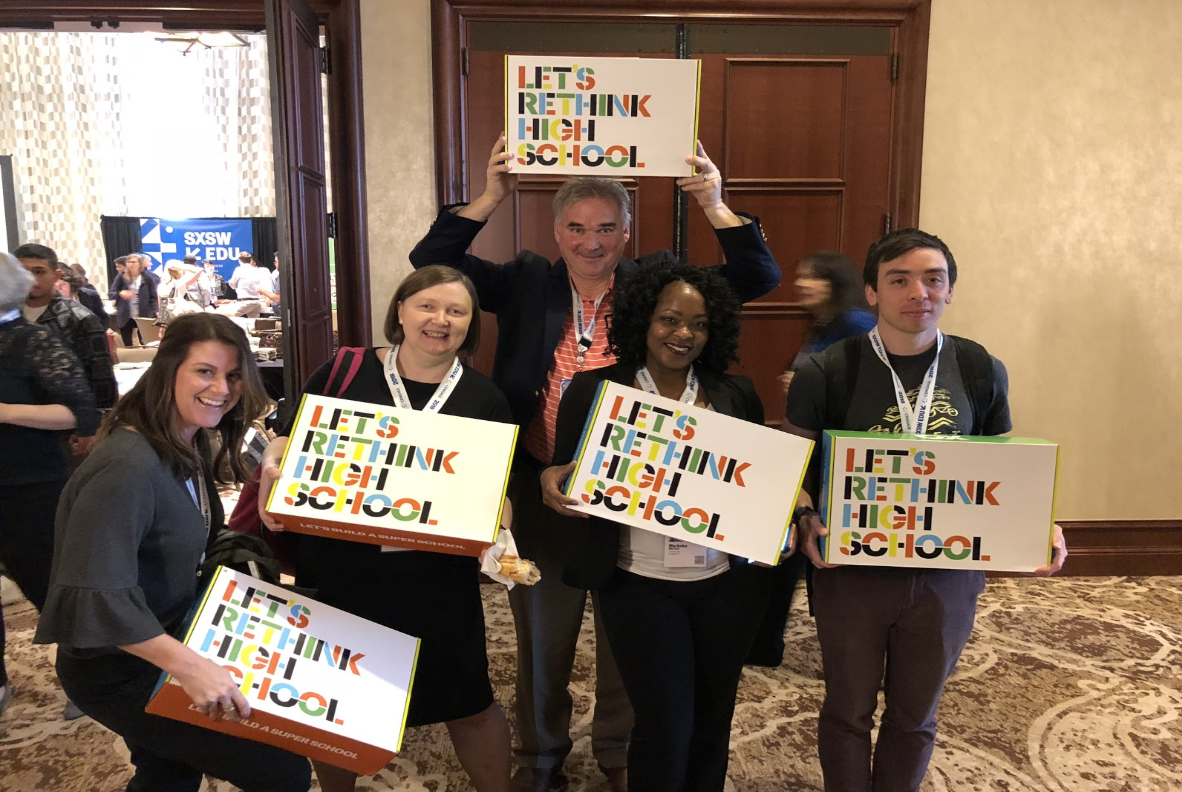The XQ community – teachers, school leaders, students, and XQ staff – had an inspiring and busy few days at the annual iNACOL conference last week in Nashville, showcasing innovations and practices that promote equity, student-centered learning, and new models for high school education in the U.S.
Members of the XQ team led nine sessions and delivered two keynote speeches at the event, which drew more than 3,000 innovation-minded teachers, school leaders, researchers and policy-makers from throughout the country.
An Urgent Need for High School Transformation
Russlynn Ali, XQ’s Chief Executive Officer, delivered the keynote address on Monday, passionately arguing for the urgent need for high school transformation – as a way to leverage change throughout the entire educational system, prepare students for the complex and constantly-evolving jobs of the future, and provide equitable opportunities for all students.
“To solve the problems (in our educational system), we need to get clear about the difference between ‘equality’ and ‘equity,’ and then commit to both,” she said to loud applause in the conference center’s Grand Ballroom. “Equality asks us to distribute opportunities equally. Equity demands that we go one step further. It is about fundamental fairness. … I hope we leave here thinking about equity as an opportunity, but also an obligation.”
She was joined on stage by four XQ school leaders and teachers who shared how they re-imagined their high schools, and how they put equity at the center.
Practicing “Diversity by Design”
Chandra Sledge Mathias, principal of Crosstown High, spoke about how her school practices “diversity by design,” recruiting students from throughout Memphis – a bold step in a city with a long history of segregation. Since it opened this fall, Crosstown is the most diverse school in Memphis, she said.
“We decided to not be driven by fear, but by possibility. We needed to be troublemakers and totally destroy the status quo in Memphis,” she said, adding, “And we don’t just want to be diverse. We want to talk about what equity means.”
“Yes, We Will do This”
Jordan Budistano, an 11th-grade computer science teacher at Washington Leadership Academy, explained how his school made computer science a requirement for all students.
“Culturally, we believe every kid can do it. We don’t just say it. We make it mandatory because we don’t want students to have the option for self-doubt,” he said. “In the end, it came down to, ‘Yes, we will do this, even though some people say it’s impossible.’”
He added, “Offering computer science to every single kid is scary… but we made a commitment to families, to kids, that we were going to give this to you.”
As Valuable as the Work of Neurosurgeons
Eric Tucker, executive director of Brooklyn Lab, spoke about his school’s efforts to recruit and train diverse teachers from the community, and ensure they’re treated with the respect that the profession deserves.
“We believe the work of teachers is as valuable and high-status as the work of neurosurgeons,” he said, to applause.
Putting Students at the Center
Suzanne McLeod, superintendent of Union-Endicott School District, home to Tiger Ventures high school, talked about the importance of putting students at the center of school redesign.
“Our vision for our students was based on what they told us,” she said. “They wanted to go to college. They wanted meaningful learning experiences.”
The Importance of Community Involvement
Earlier in the day, Mike Posthumus, a consultant from Grand Rapids Public Museum School; Ginger Spickler, director of partnerships and projects at Crosstown; Alex Campbell, a teacher at Elizabethton High School; and Mathias, of Crosstown, led a panel on “Designing the Next Super School.”
They shared tips on the planning process, how to use XQ’s free open-source design materials, and the importance of community involvement.
“We wanted to have a school that not just the district buys into, but the whole community buys into,” Spickler said. “We asked kids, what do you dream about? What do you want your school to be? It was very powerful to hear, especially for the community.”
Keeping the “Why” at the Forefront
Scott Bess, head of Purdue Polytechnic High; Chris Terrill, director at Crosstown; and Sunny Summers, school leader at New Harmony High, focused on the nuts-and-bolts of school redesign – such as recruiting teachers, arranging student internships, and figuring out new assessments – during a panel titled “Starting an Innovative School: Navigating from Vision to Execution.”
“Innovation is hard. It’s really, really hard. What you have to keep at the forefront is the ‘why.’ Because everything else will drag you back to the norm,” Bess said. “You have to keep pushing the envelope. It helps to have one person at the school whose sole job is to set you on true north. Because we’re not going back.”
Finding new ways to measure students’ learning has been a priority at Crosstown, said Terrill. The school uses a competency-based assessment model that measures students’ ability to read critically, lead inquiries, design solutions, and reach other learning goals.
“The current system of assessments is not good for kids. It’s punitive for kids. It’s taking us backward and not forward,” he said. “We need to look for other ways to measure student success.”
A Focus on CBE
Policy and research experts led an afternoon session on “Scaling Competency-Based Education: Equity-Focused Strategies for Policy and Practice.” Panelists included: Michele Cahill, XQ chief education content and practice officer; David Ruff, executive director of Great Schools Partnership; Shatoya Ward, principal at Purdue Polytechnic High; and Tom Vander Ark, chief executive of Getting Smart.
Making competency-based education a reality in high schools – and why it’s important – was the focus of their discussion.
“We want our graduates to come up with solutions to problems in their world. Our job is to make sure they have the passion and purpose and strategies to do that,” said Ward, adding that education based on competency helps students attain those goals.
Vander Ark explained how new technology, such as blockchain, can play a key role in competency-based education. A type of online ledger, blockchain can be used to streamline student records and achievements and make them more accessible to students, schools, colleges, and employers.
“Blockchain is going to enable personal, secure learning transcripts for everyone,” he said. “But we shouldn’t assume schools are going to figure this (and other CBE tools) out on their own. We need robust networks to bring this to scale.”
Ruff emphasized the urgent need for schools to shift toward competency-based education, especially in regards to equity, and for the broader education community to support those efforts.
“We can hang around and do it a little bit, but at some point, I think we have a moral requirement to really move in this new direction,” he said. “It needs to be required. But simply saying, ‘Do it, damnit,’ is not going to be successful. We need a cohesive and thoughtful process to make this happen.”
Reaching All Students
Tuesday afternoon, two teachers from Washington Leadership Academy led a session on “The Sweet Spot on Scaffolding.” Sarah Hartzell, who teaches 10thgrade English language arts, and Steve Cottington, a 9th-grade computer science teacher, offered tips and resources for reaching all students, regardless of their skill level and experience.
Never Stop Advocating
Also on Tuesday, Jemar Lee, an alumnus of Iowa BIG and fellow at Education ReImagined, delivered the noon keynote, describing his experience with student-centered learning and urging the education community to continue advocating for new high school models. He also interviewed four students from non-traditional schools about their learning experiences.
Lee said that attending Iowa BIG, where students do interdisciplinary, real-world projects in their community, changed his life.
“After joining Iowa BIG, I finally realized my own worth. I stopped asking myself, am I smart? I started asking, how am I smart?” he said. “I know this work is hard, but I ask that you never give up. Because we should never allow our problems to defeat us.”
Follow the journey of all 18 XQ Super Schools and tell us how you are joining the movement on Twitter, Facebook, Instagram and with the hashtag #ReThinkHighSchool. Find iNACOL’s other events and initiatives here.
TAGS:



 Tweet
Tweet 



